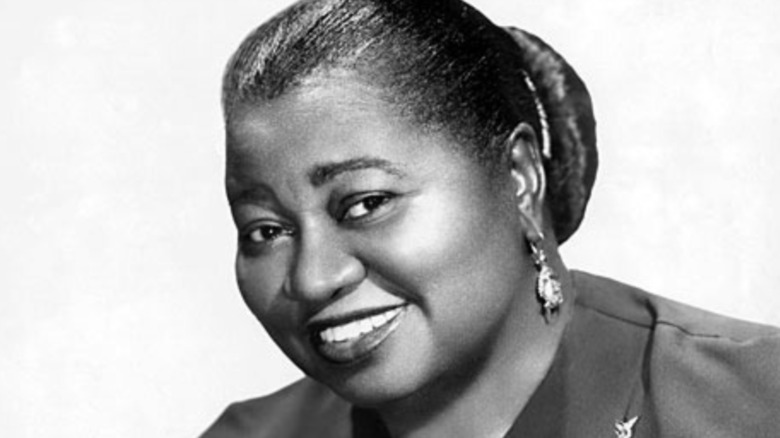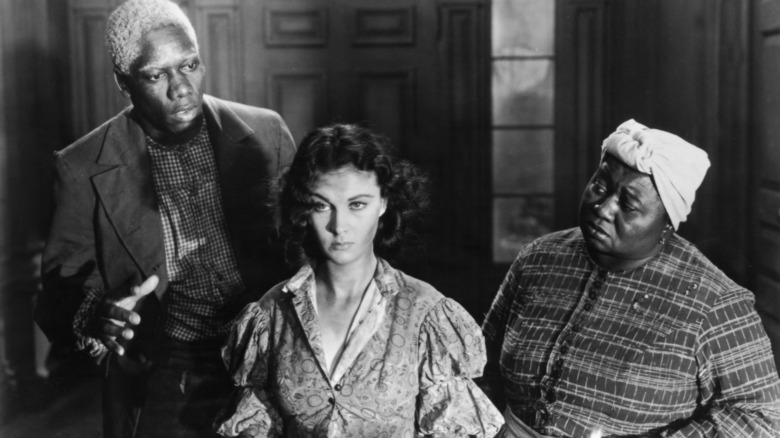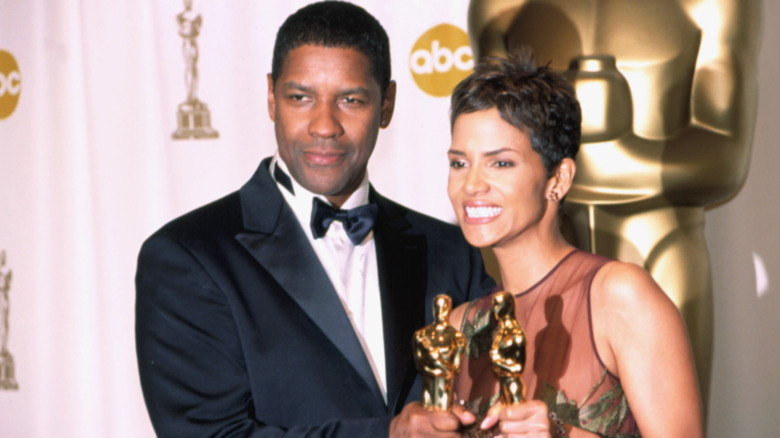Why Hattie McDaniel's Oscar Win Was So Significant
Famed actress Hattie McDaniel made history at the 12th Academy Awards show in 1940, when she took home an Oscar. She won the award for best actress in a supporting role for her performance as "Mammy" in the 1939 antebellum romance film "Gone With the Wind." The Kansas-born actress became the first Black person to be nominated and first Black actor to win the award. It was particularly poignant during a time when not a lot of Black actors worked in film, and when the U.S. was very racially segregated.
Those segregation laws meant that some strings had to be pulled for McDaniel to even get a seat at a ceremony, per Pop Sugar. It all had to be arranged by the film's producer, David Selznick, who advocated for McDaniel to be in attendance at The Ambassador Hotel, where that year's Academy Awards ceremony was being held in the lodge's club. Despite being allowed to attend, however, she still wasn't allowed a seat at the table with her fellow castmates (who were also nominated). McDaniel sat on the opposite end of the club before her historic win was announced. Her emotionally memorable speech was met with applause. "This is one of the happiest moments of my life, and I want to thank each one of you who had a part in selecting me for one of the awards for your kindness," said McDaniel. (Her acceptance speech is posted in its entirety at the Academy Awards Acceptance Speech Database.)
Hattie McDaniel's Oscar win broke the color barrier
Even though her performance earned her an Oscar, she received criticism for the role that Black Americans saw as a negative stereotype. McDaniel touched on her feelings regarding that in her acceptance speech.
"It has made me feel very, very humble and I shall always hold it as a beacon for anything I may be able to do in the future. I sincerely hope I shall always be a credit to my race and to the motion picture industry," she said.
McDaniel's Oscar win was the start of a new era for Black performers. Not only did she break the color barrier, she also gave other Black actors hope that the feat was possible. But it took 10 years before another Black actor was nominated for an Oscar again, and would take 24 years after her win before another Black actor would take home an Oscar. Actress Ethel Waters was nominated in 1949, and actor Sidney Poitier won best actor in 1964. In between that time, though, actresses Dorothy Dandridge and Juanita Moore earned nominations for best actress and supporting actress in 1954 and 1958, respectively. And Poitier had picked up a nom in 1958 for his performance in "The Defiant Ones," several years before his win for "Lilies of the Field."
The wave of Black actors after McDaniel's Oscar win
Things were slowly but surely changing. By the time Ethel Waters got her nomination a decade after McDaniel's, no strings needed to be pulled for her to attend the awards show. And Poitier would say in his winning speech (also at the Acceptance Speech Database) that the journey to his win made him "... naturally indebted to countless numbers of people..."
In the decades after McDaniel's win there would be more Black nominees and Oscar winners. And at the turn of the 20th century, it was a normal occurrence to see Black guests at the ceremony as presenters, performers, nominees, and winners. A historic moment for Black Hollywood came in 2002, when Denzel Washington and Halle Berry both won Oscars, for best actor and actress, on the same night — something that probably would have been seen as impossible in 1940. In her acceptance speech, Berry would credit Hattie McDaniel and others for paving the way for her, bringing back collective recollection of the actress. The same situation would happen again in 2007, when Jennifer Hudson and Forest Whitaker also took home Oscars the same night for their respective performances.
Oscars sees diversity through the years despite criticisms
While the Academy Awards, along with its voting members (per Vox, in 2016) has received criticism over the years for its lack of diversity, it's also true that the highest Hollywood acting awards have recognized the work of many esteemed Black actors and creators. A lot has changed since McDaniel's Oscar win. Since 1940, 18 Black men and women have won an Oscar in acting categories. In the non-acting categories, Black creators have won for music, short films, screenplay, documentaries, sound, and costume design. And there's no shortage of nominations. To date, there have been Black nominees in almost every category, per Indie Wire, though of course that varies from year to year. In 2015, a lack of non-white nominees shifted expectations and spearheaded the #OscarsSoWhite Twitter campaign, which picked up steam again in 2016 (via Britannica).
McDaniel's win changed the landscape for many future Academy Award events and other award shows. When other acting award ceremonies like the Golden Globes and Screen Actors Guild came around, they didn't really get the same criticisms. But all the shows have been slammed at one point for either lacking or snubbing Black nominees.
The Academy Awards airs Sunday, April 25, on ABC.



